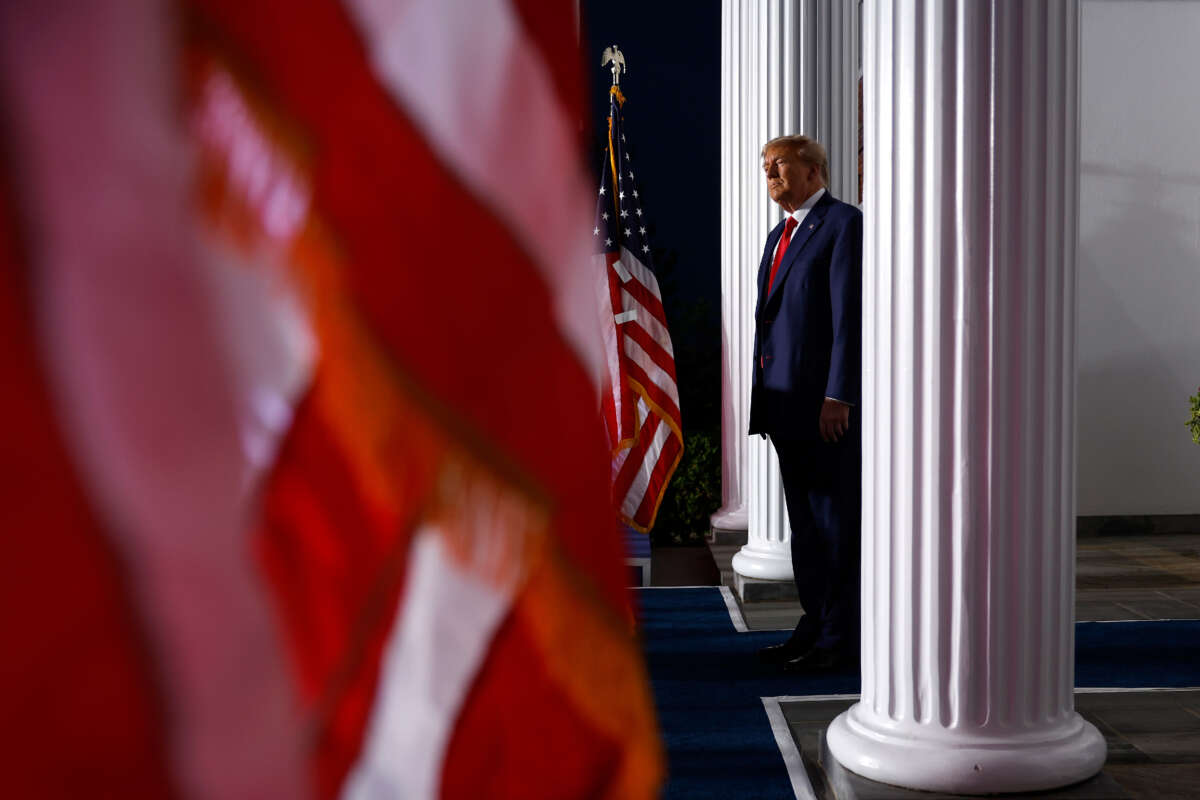Honest, paywall-free news is rare. Please support our boldly independent journalism with a donation of any size.
A new report reveals that former President Donald Trump’s advisers, since his exit from office, repeatedly sought to have him cooperate with the federal government when it came to returning documents he improperly removed from the White House — but that Trump refused to do so.
On Tuesday, Trump was formally arraigned on 37 charges, including willfully retaining sensitive government materials and obstructing efforts by federal officials to retrieve them. Trump has pleaded “not guilty” to the charges handed down by the DOJ, though legal experts have said that the evidence against him is quite damning.
The Washington Post, citing several sources with knowledge of Trump’s interactions with his lawyers and advisers, reported on Wednesday that Trump “eschewed opportunities” to discuss deals to return the documents, hundreds of them marked classified, to the National Archives and Records Administration (NARA) and the Department of Justice (DOJ).
Trump likely could have avoided the indictment charges had he struck a deal with the DOJ before last summer. As evidence that a deal could have helped, The Post pointed out in its report that none of the documents cited in the indictment included those he voluntarily returned.
The report included numerous examples of Trump rebuffing his lawyers’ efforts to return the documents or discuss the possibility of a deal with federal officials.
Trump’s first opportunity to cooperate, for example, came in early 2021, when NARA lawyer Gary Stern reached out to Trump’s people to try to retrieve many of the documents that were taken. Some of Trump’s lawyers tried to convince him to return the materials at that time, but he refused to listen to them, reportedly confusing NARA officials who kept insisting that the documents, which belong to the government and not the former president, be returned.
Trump and his legal team only relented and allowed the retrieval of some documents in early 2022, after NARA threatened to involve Congress.
Even then, however, Trump continued to refuse to cooperate with the agency, as well as with the DOJ, which got involved after NARA realized that the former president still had highly classified documents in his possession, even after the initial retrieval.
The Justice Department then issued a subpoena for the return of the remaining classified materials, which Trump, through his lawyers, affirmed he had complied with in an affidavit written in June. However, Trump had his personal valet, Walt Nauta, move boxes just before his lawyers tried to comply with the subpoena, limiting their ability to search through the entirety of documents Trump had in his possession.
In the fall of 2022, when the FBI executed a search warrant at Mar-a-Lago and recovered thousands of additional documents, including more than 100 marked classified, Trump again thwarted his lawyers’ efforts to negotiate a deal. Although Trump lawyer Christopher Kise advised Trump to seek a settlement in order to avoid a possible indictment, Trump wasn’t interested in doing so, according to three sources speaking to The Post.
Instead of listening to his lawyers, Trump took advice from people who gave him dubious legal guidance, including Tom Fitton, head of the right-wing legal advocacy organization Judicial Watch. Fitton, who isn’t actually a lawyer, advised Trump to fight the actions of the DOJ, and told Trump, wrongly, he had every right to hold onto the documents he had taken from the government.
Several Trump advisers have told The Post that they blame Fitton, in part, for Trump’s refusal to consider a deal, as Fitton presented false equivalencies regarding other former presidents’ actions surrounding personal documents.
Reacting to The Washington Post’s report, CNN legal analyst Elie Honig said it was unsurprising that Trump chose to heed Fitton’s words but not those of his lawyers.
“Donald Trump is magnetically attracted to the worst possible advice. It’s been a theme from the time he took office,” Honig said, adding that “people like Tom Fitton” have led Trump “into more legal trouble” over the past several years.
A terrifying moment. We appeal for your support.
In the last weeks, we have witnessed an authoritarian assault on communities in Minnesota and across the nation.
The need for truthful, grassroots reporting is urgent at this cataclysmic historical moment. Yet, Trump-aligned billionaires and other allies have taken over many legacy media outlets — the culmination of a decades-long campaign to place control of the narrative into the hands of the political right.
We refuse to let Trump’s blatant propaganda machine go unchecked. Untethered to corporate ownership or advertisers, Truthout remains fearless in our reporting and our determination to use journalism as a tool for justice.
But we need your help just to fund our basic expenses. Over 80 percent of Truthout’s funding comes from small individual donations from our community of readers, and over a third of our total budget is supported by recurring monthly donors.
Truthout has launched a fundraiser to add 500 new monthly donors in the next 9 days. Whether you can make a small monthly donation or a larger one-time gift, Truthout only works with your support.
